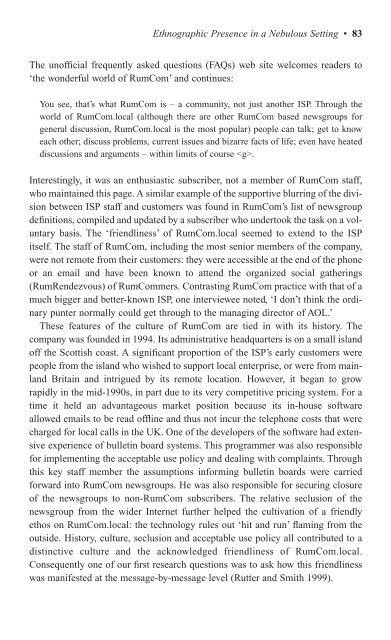Virtual Methods
Virtual Methods
Virtual Methods
Create successful ePaper yourself
Turn your PDF publications into a flip-book with our unique Google optimized e-Paper software.
Ethnographic Presence in a Nebulous Setting • 83<br />
The unofficial frequently asked questions (FAQs) web site welcomes readers to<br />
‘the wonderful world of RumCom’ and continues:<br />
You see, that’s what RumCom is – a community, not just another ISP. Through the<br />
world of RumCom.local (although there are other RumCom based newsgroups for<br />
general discussion, RumCom.local is the most popular) people can talk; get to know<br />
each other; discuss problems, current issues and bizarre facts of life; even have heated<br />
discussions and arguments – within limits of course .<br />
Interestingly, it was an enthusiastic subscriber, not a member of RumCom staff,<br />
who maintained this page. A similar example of the supportive blurring of the division<br />
between ISP staff and customers was found in RumCom’s list of newsgroup<br />
definitions, compiled and updated by a subscriber who undertook the task on a voluntary<br />
basis. The ‘friendliness’ of RumCom.local seemed to extend to the ISP<br />
itself. The staff of RumCom, including the most senior members of the company,<br />
were not remote from their customers: they were accessible at the end of the phone<br />
or an email and have been known to attend the organized social gatherings<br />
(RumRendezvous) of RumCommers. Contrasting RumCom practice with that of a<br />
much bigger and better-known ISP, one interviewee noted, ‘I don’t think the ordinary<br />
punter normally could get through to the managing director of AOL.’<br />
These features of the culture of RumCom are tied in with its history. The<br />
company was founded in 1994. Its administrative headquarters is on a small island<br />
off the Scottish coast. A significant proportion of the ISP’s early customers were<br />
people from the island who wished to support local enterprise, or were from mainland<br />
Britain and intrigued by its remote location. However, it began to grow<br />
rapidly in the mid-1990s, in part due to its very competitive pricing system. For a<br />
time it held an advantageous market position because its in-house software<br />
allowed emails to be read offline and thus not incur the telephone costs that were<br />
charged for local calls in the UK. One of the developers of the software had extensive<br />
experience of bulletin board systems. This programmer was also responsible<br />
for implementing the acceptable use policy and dealing with complaints. Through<br />
this key staff member the assumptions informing bulletin boards were carried<br />
forward into RumCom newsgroups. He was also responsible for securing closure<br />
of the newsgroups to non-RumCom subscribers. The relative seclusion of the<br />
newsgroup from the wider Internet further helped the cultivation of a friendly<br />
ethos on RumCom.local: the technology rules out ‘hit and run’ flaming from the<br />
outside. History, culture, seclusion and acceptable use policy all contributed to a<br />
distinctive culture and the acknowledged friendliness of RumCom.local.<br />
Consequently one of our first research questions was to ask how this friendliness<br />
was manifested at the message-by-message level (Rutter and Smith 1999).



